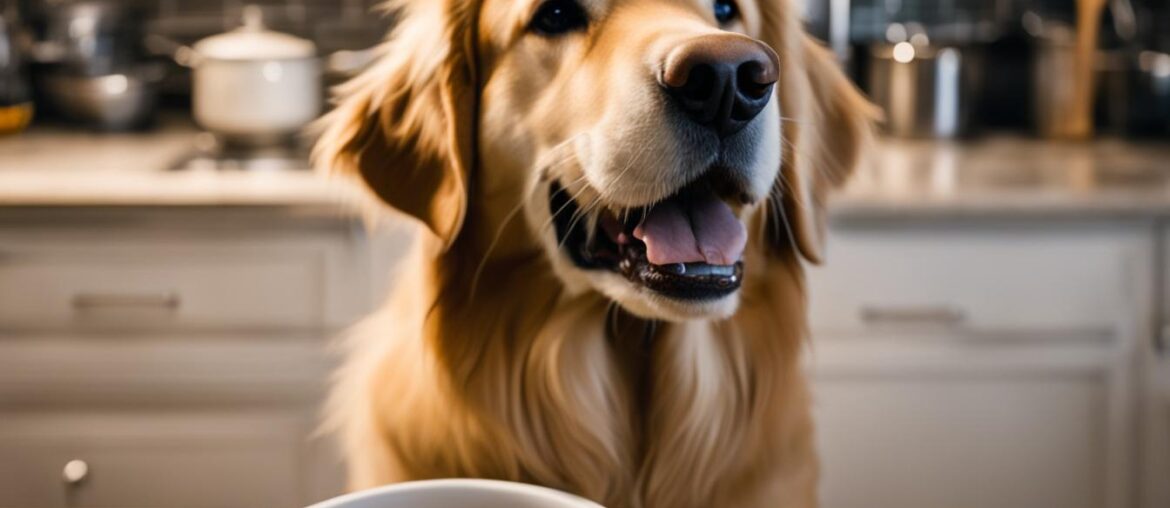When it comes to dog nutrition and finding safe food options for our furry friends, many dog owners wonder if it’s okay to give their dogs chicken broth. Chicken broth can be a tasty and nutritious addition to a dog’s diet, but it’s important to approach it with caution and consider their individual needs. As a professional veterinarian, I’ll provide you with insights about whether dogs can eat chicken broth and what you need to know before introducing it into their meals.
Key Takeaways:
- Chicken broth can be a safe and nutritious addition to a dog’s diet when prepared properly.
- Consult with your veterinarian before introducing any new foods to your dog, including chicken broth.
- Consider your dog’s age, health history, and dietary restrictions before giving them chicken broth.
- Choose plain, low-sodium chicken broth or make homemade broth without harmful additives like onion and garlic.
- Feed chicken broth to your dog in small amounts as part of a balanced diet.
Is Chicken Good for Dogs?
When it comes to a dog’s diet, incorporating chicken can be a healthy choice. Not only is chicken a great source of protein, but it also provides essential nutrients such as vitamin B6, vitamin B3, and zinc. These nutrients contribute to your dog’s overall health and well-being.
However, it is important to prepare chicken correctly to ensure your dog’s safety. Thoroughly cooking the chicken is crucial to eliminate the risk of foodborne illnesses like salmonella. Cooked chicken should be free from any pink or raw parts. It is also essential to remove any bones before feeding chicken to your dog, as they can pose a choking hazard and potentially cause digestive issues.
While chicken is commonly found in commercial dog food and treats, moderation is key in providing a balanced diet for your furry friend. It is recommended to consult with your veterinarian to determine the appropriate amount of chicken to incorporate into your dog’s meals based on their specific dietary needs.
“Chicken is a valuable addition to a dog’s diet, providing necessary protein and essential nutrients. However, it is crucial to cook it thoroughly and remove any bones to ensure your dog’s safety and prevent any potential hazards.”
Chicken: A Nutritional Powerhouse
Here are some key nutritional benefits of chicken for dogs:
- Rich in protein: Chicken is a lean source of protein, which is crucial for muscle development, growth, and repair.
- Vitamin B6: This vitamin supports brain function, hormone regulation, and healthy immune system function in dogs.
- Vitamin B3: Also known as niacin, vitamin B3 plays a crucial role in energy production and maintaining healthy skin and coat.
- Zinc: Chicken contains zinc, which supports immune function, cell division, and wound healing in dogs.
It’s important to note that while chicken is beneficial, it should not be the sole component of your dog’s diet. A well-rounded diet should consist of a variety of protein sources, carbohydrates, healthy fats, and essential vitamins and minerals. Consulting with a veterinarian can help ensure your dog’s diet meets their nutritional needs.
Can Dogs Eat Raw Chicken?
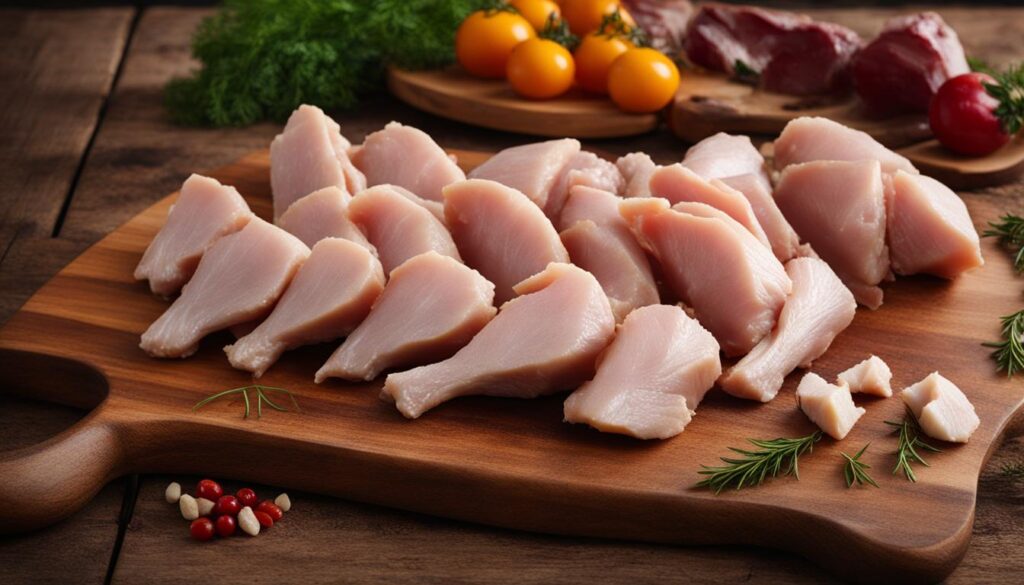
Feeding dogs raw chicken is not recommended due to the potential risks it poses to their health. Raw chicken can be contaminated with harmful bacteria like salmonella and E. coli, which can cause foodborne illnesses in dogs. To ensure your dog’s safety and well-being, it’s crucial to thoroughly cook chicken before giving it to them.
Cooking the chicken will help eliminate any potential bacteria and reduce the risk of foodborne illnesses. By properly cooking the chicken, you can provide a safe and healthy meal for your furry friend. It’s always better to be cautious when it comes to raw food and prioritize your dog’s health.
What Chicken Products Can Dogs Eat?

When it comes to chicken products that dogs can eat, it’s important to choose safe and nutritious options. Here are some guidelines to follow:
1. Boiled Chicken
Boiled chicken is a healthy choice for dogs, especially those with digestive issues. It’s often recommended by veterinarians for dogs experiencing vomiting or diarrhea. Boiling the chicken helps remove excess fat and makes it easier for dogs to digest. Just be sure to cook it thoroughly and remove any bones before feeding it to your furry friend.
2. Fried Chicken
“Fried chicken can cause digestive upset and may contain toxic ingredients for dogs.”
While fried chicken may be tempting to share with your dog, it’s best to avoid it. Fried chicken is high in fat and can cause digestive issues in dogs. Additionally, the seasonings and breading used in fried chicken can be harmful to dogs. It’s best to stick with healthier alternatives.
3. Chicken Nuggets
Chicken nuggets, although they may not make dogs sick in small amounts, are not a healthy treat option. They are typically heavily processed and contain additives such as preservatives, salt, and other ingredients that are not beneficial for dogs. It’s best to opt for natural, dog-friendly treats that are specifically made for them.
4. Chicken Feet
Chicken feet, whether raw or cooked, should be avoided. They can pose a choking hazard and may cause digestive issues in dogs. Additionally, chicken feet can carry harmful bacteria that can make your dog sick. It’s best to steer clear of feeding chicken feet to your furry companion.
Remember, when choosing chicken products for your dog, it’s important to prioritize their health and well-being. Always consult with your veterinarian for specific dietary recommendations and ensure that the chicken is cooked properly, free from harmful seasonings, and served in appropriate portions.
Can Dogs Eat Chicken Broth?

Dogs can consume chicken broth as long as it does not contain any harmful additives. Canned chicken broth often includes ingredients like onion and garlic, which are toxic to dogs. However, plain, low-sodium chicken broth or homemade broth can be a nice addition to a dog’s food bowl when given in small amounts. Chicken broth can add flavor to their meals and provide hydration. It is important to avoid any chicken broth that contains harmful ingredients and always check the labels before purchasing.
| Ingredients in Chicken Broth | Is it Safe for Dogs? |
|---|---|
| Plain, low-sodium chicken broth | Yes |
| Canned chicken broth with onion and garlic | No |
| Homemade chicken broth | Yes |
Can Dogs Eat Chicken Bones?
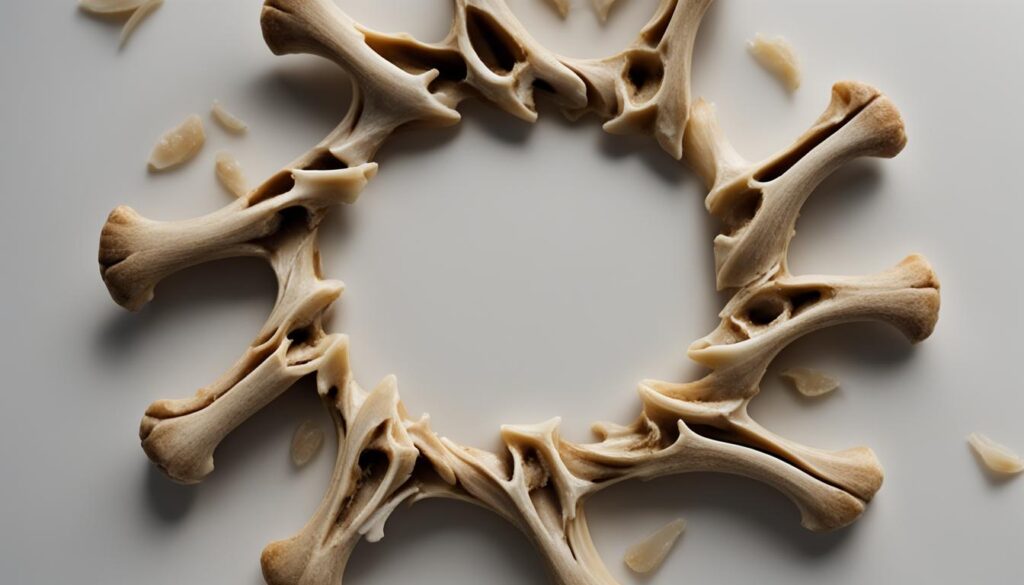
It is crucial to never let your dog eat chicken bones. Chicken bones can cause serious internal problems, including choking, splintering, and digestive issues. The tiny, sharp edges of chicken bones can cut a dog’s stomach and intestines, potentially leading to severe medical conditions.
Instead of giving your dog chicken bones, it is important to provide safer alternatives for them to chew on. These alternatives can help satisfy their chewing instincts and promote dental health without the risks associated with chicken bones.
Safe Alternatives for Dogs to Chew On
1. Chicken-Flavored Chew Bones: Chicken-flavored chew bones are designed specifically for dogs and provide a safe and enjoyable chewing experience. They are made with dog-friendly ingredients and come in a variety of sizes to suit different breeds and chewing habits.
2. Other Chew Toys: There are various chew toys available in pet stores that are designed to be safe and durable for dogs to chew on. Look for toys made from non-toxic materials, such as rubber or nylon, that are specifically designed for strong chewers.
3. Rawhide Alternatives: If your dog enjoys chewing on rawhide, consider choosing alternative options such as natural chews made from yak milk or sweet potato. These alternatives are digestible and safer for your dog compared to traditional rawhide.
In summary, it is essential to prioritize your dog’s safety and avoid giving them chicken bones. Instead, provide them with safe alternatives such as chicken-flavored chew bones or other chew toys. These alternatives will satisfy their chewing needs while minimizing the risks associated with chicken bones.
| Chicken Bones | Dangers | Safe Alternatives |
|---|---|---|
| Can cause choking | Chicken bones can become lodged in a dog’s throat, leading to choking and potential asphyxiation. | Chicken-flavored chew bones, other chew toys, rawhide alternatives |
| May splinter | Chicken bones can splinter when chewed and cause internal injuries to a dog’s digestive system. | |
| Can cut the stomach and intestines | The sharp edges of chicken bones can cut through a dog’s stomach and intestines, leading to serious medical conditions. |
Can Dogs Be Allergic to Chicken?
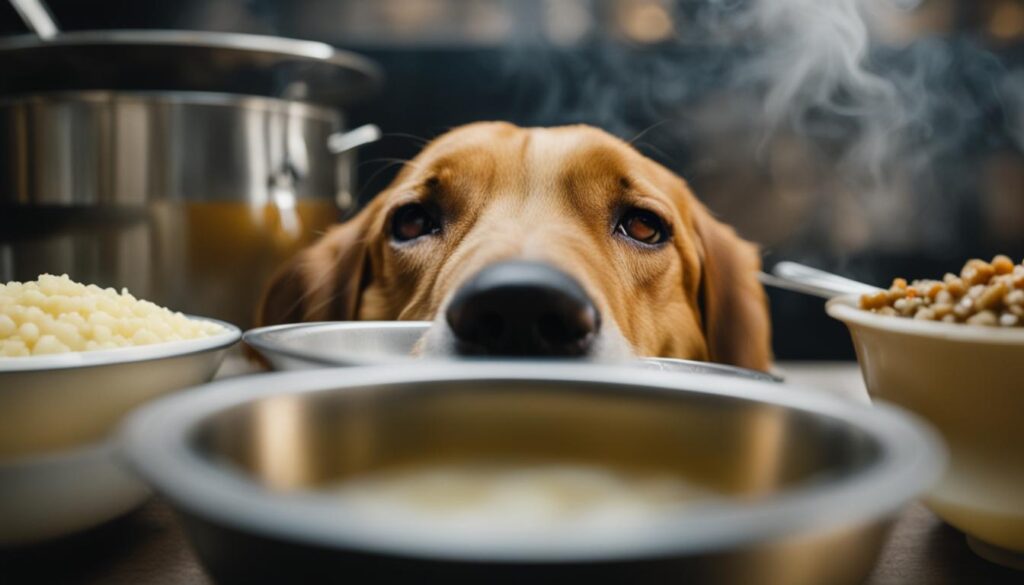
Dogs can develop allergies to various protein sources, including chicken. Chicken, along with beef, dairy, egg, lamb, and fish, is one of the most common allergens for dogs. Food allergies in dogs often manifest as skin and coat issues, but they can also cause gastrointestinal problems. If you notice symptoms such as itching, redness, diarrhea, or vomiting after your dog consumes chicken, it is possible that they have an allergy. It is recommended to consult with a veterinarian to determine the cause of the allergy and to explore potential dietary modifications.
Food allergies in dogs can be a frustrating and concerning issue for pet owners. It’s important to recognize the signs and symptoms of allergies to provide appropriate care and alleviate discomfort for your furry friend. Chicken allergies in dogs are relatively common, and being aware of the potential allergy symptoms can help you identify and manage the condition.
Allergy Symptoms in Dogs
- Intense itching and scratching
- Redness and inflammation of the skin
- Hives or bumps on the skin
- Chronic ear infections
- Gastrointestinal issues such as diarrhea or vomiting
- Unexplained hair loss or poor coat quality
If you suspect that your dog has a chicken allergy, it’s important to consult with your veterinarian for a proper diagnosis. They may recommend diagnostic tests, such as blood tests or elimination diets, to identify the specific allergen and provide guidance for managing the allergy.
Food allergies in dogs can be managed effectively through dietary modifications and avoidance of the allergen. Your veterinarian may recommend a hypoallergenic diet or prescribe medications to alleviate symptoms.
It’s crucial to remember that every dog is unique, and what works for one may not work for another. Working closely with your veterinarian will ensure that your dog receives the appropriate care and support to manage their chicken allergy.
How Much Chicken Should You Feed Your Dog?
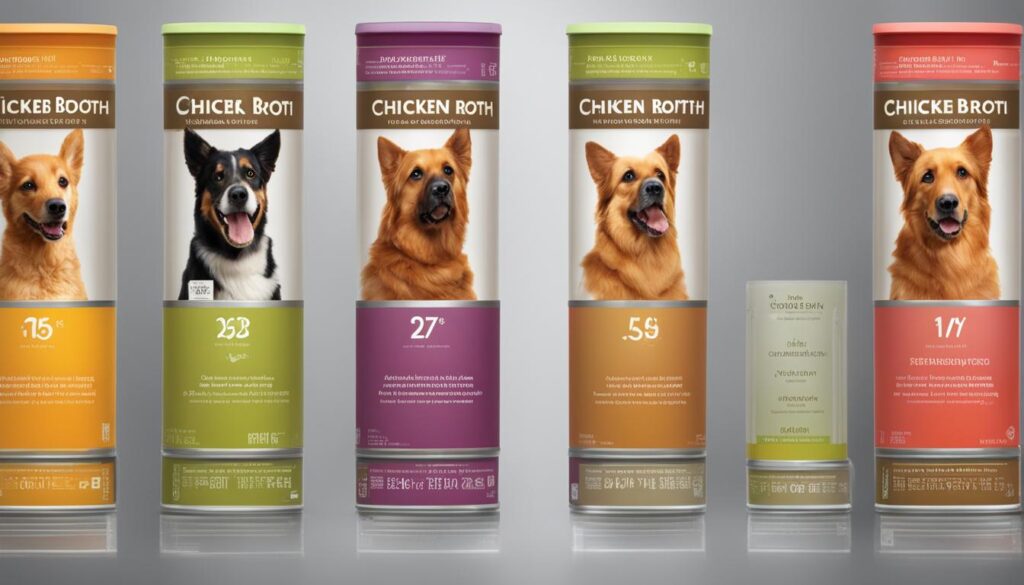
When it comes to incorporating chicken into your dog’s diet, it’s important to determine the appropriate portion size based on their weight and nutritional needs. Feeding your dog the right amount of chicken helps ensure they receive the necessary protein and nutrients without overfeeding or causing digestive issues. As a general guideline, dogs should have about 1/4 to 1/3 cup of cooked, unseasoned chicken per 20 pounds of body weight each day. However, it’s crucial to consider other factors such as their overall diet and activity level when determining the ideal portion size.
Remember to monitor your dog’s weight and body condition regularly to make adjustments to their chicken intake if needed. Overfeeding can lead to weight gain, while underfeeding may result in nutritional deficiencies. It’s always best to consult with your veterinarian to ensure your dog’s specific dietary requirements are met.
To provide a clear understanding of how much chicken to feed your dog based on their weight, refer to the following table:
| Weight of Dog | Portion of Cooked, Unseasoned Chicken |
|---|---|
| 10 pounds | 1/8 to 1/6 cup |
| 20 pounds | 1/4 to 1/3 cup |
| 30 pounds | 1/3 to 1/2 cup |
| 40 pounds | 1/2 to 2/3 cup |
| 50 pounds | 2/3 to 3/4 cup |
Always remember that these are general guidelines, and individual dogs may have different calorie requirements based on their metabolism, activity level, and overall health. Adjust the portion size accordingly to maintain a healthy weight and meet their specific needs.
Wrapping Up
When it comes to incorporating chicken broth into your dog’s diet, prioritizing their safety and overall health should be your top priority. Chicken broth can be a safe and nutritious addition, but it is essential to prepare it without any harmful additives like onion and garlic.
Moderation is key when feeding your dog chicken broth, and portion sizes should be adjusted based on their weight and dietary requirements. It is always recommended to consult with your veterinarian before introducing any new foods or making significant changes to your dog’s diet.
Providing a balanced and nutritious diet is crucial for your dog’s optimal health and well-being. Alongside chicken broth, consider incorporating other homemade dog food options that meet their nutritional needs. Your veterinarian can provide valuable guidance and recommendations to ensure your dog receives the best possible care. Remember, the safety and health of your beloved pet should always be your top priority.
FAQ
Is chicken broth safe for dogs?
When it comes to giving your dog chicken broth, it’s important to consider their overall health and specific dietary needs. While chicken broth can be a safe and nutritious addition to a dog’s diet, it’s always best to consult with your veterinarian before introducing any new foods.
Is chicken good for dogs?
Chicken can be a healthy food for dogs when prepared correctly. It is a great source of protein and contains essential nutrients such as vitamin B6, vitamin B3, and zinc. However, it’s important to cook the chicken thoroughly and remove any bones before feeding it to your dog.
Can dogs eat raw chicken?
It is not recommended to feed dogs raw chicken. Raw chicken can harbor harmful bacteria like salmonella and E. coli, which can make dogs very sick. It is crucial to thoroughly cook chicken before sharing it with your dog to ensure their safety and well-being.
What chicken products can dogs eat?
Dogs can safely eat boiled chicken, especially if they have digestive issues. However, fried chicken and chicken prepared with seasonings like garlic and onions should be avoided. Chicken nuggets are not a healthy treat option, and chicken feet should also be avoided due to digestive issues and the risk of harmful bacteria.
Can dogs eat chicken broth?
Dogs can consume chicken broth as long as it does not contain any harmful additives. Plain, low-sodium chicken broth or homemade broth can be a nice addition to a dog’s food bowl when given in small amounts. Always check the labels for harmful ingredients before purchasing.
Can dogs eat chicken bones?
It is crucial to never let your dog eat chicken bones. Chicken bones can cause serious internal problems, including choking, splintering, and digestive issues. Provide safer alternatives for dogs to chew on, such as chicken-flavored chew bones or other chew toys.
Can dogs be allergic to chicken?
Dogs can develop allergies to various protein sources, including chicken. If you notice symptoms such as itching, redness, diarrhea, or vomiting after your dog consumes chicken, it is possible that they have an allergy. Consult with a veterinarian to determine the cause of the allergy and explore potential dietary modifications.
How much chicken should you feed your dog?
The amount of chicken you should feed your dog depends on their weight. As a general guideline, dogs should have about 1/4 to 1/3 cup of cooked, unseasoned chicken per 20 pounds of body weight each day. Adjust the portion size according to your dog’s overall diet and consult with your veterinarian if necessary.
Wrapping Up
When it comes to incorporating chicken broth into your dog’s diet, it is crucial to prioritize their safety and overall health. While chicken broth can be a safe and nutritious addition, it should be prepared without harmful additives like onion and garlic. Moderation is key, and portion sizes should be adjusted based on your dog’s weight and dietary requirements. Always consult with your veterinarian before introducing any new foods or making significant changes to your dog’s diet.


